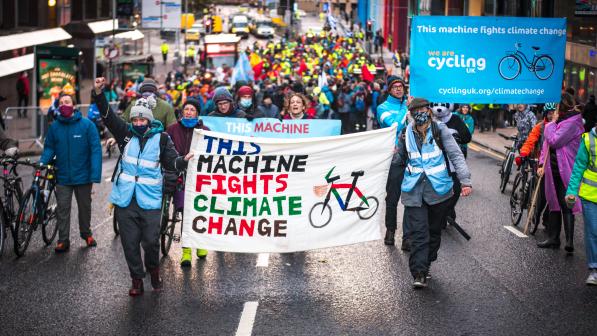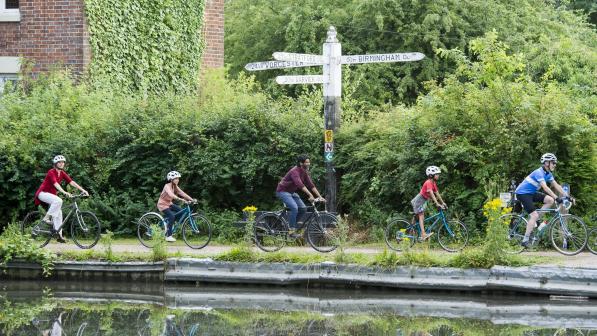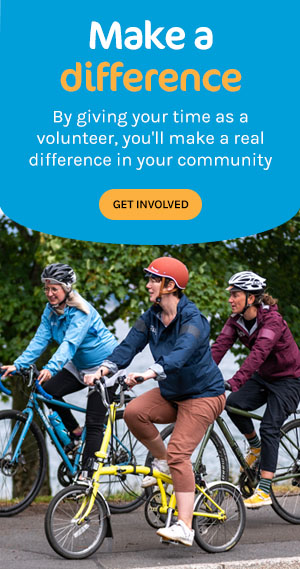Meet the campaigner: Emily Williams, bicycle mayor of Inverness

What’s your story?
I have always been a keen cyclist, both for transport and as a sport, but my route to campaigning has been a bit of a slow burn. Cycling with children on the road really brought into focus just how intimidating the local roads seem to most people. I started delivering Bikeability at the local primary school, and talking to people about how hard the school was to access by bike.
During the coronavirus pandemic, the council announced lots of ‘spaces for people’ measures (with overwhelming public support) only to have half of them removed a few months later. We started organising regular Kidical Mass rides - which have become an amazingly positive force for cycle campaigning - and contacting councillors in support of cycling infrastructure. I was encouraged to apply for the position of bicycle mayor of Inverness by Saskia Heijltjes, who has been really active in the Kidical Mass network and is the bicycle mayor of Bath.

What is the role of a bicycle mayor?
The bicycle mayor network provides support and resources for grass roots campaigners around the world, and is coordinated by BYCS, an Amsterdam-based global non-governmental organisation (NGO) supporting community-led urban change through cycling.
As part of the application process I had to identify what I wanted to achieve in my term, and settled on three main aims:
- encourage people to engage with councillors and consultations in support of cycling and walking schemes
- introduce playstreets and parklets to the Highlands
- grow a network of bicycle mayors across Scotland
Parklets and play streets are a great way to show how road space could be used if it wasn't dominated by cars and parking. A play street where a quiet residential road is closed by residents for a few hours, usually at the weekend, so that children can meet and play right near their houses without having to worry about any traffic. A parklet is a micro-park built in a suspended parking space - the only limit on what goes in is your imagination, but it is a brilliant opportunity to start community growing and to make a green space where people can meet and talk with their neighbours.
There has been a lot of work in Inverness developing active travel strategies and plans, and I really want to work with the council to get them delivered. I’ll be speaking to local councillors to advocate positively for cycling infrastructure, explaining my experiences of cycling in Inverness, cycling with my child and how much of an impact it would have on him if he could cycle independently round our town.

What’s going well in Inverness?
The first part of the Inverness city active travel network - the section on Riverside Way - is going to begin construction this summer. This road connects the town, the river, the leisure centre, the ice rink, the pump track and sports pitches so it’s a really important link, especially for families and children attending sports clubs.
As part of ‘spaces for people’ the road was made one-way with a contraflow cycle lane, which has reduced the amount of traffic and made it a more comfortable place to cycle.
This scheme was the first where we organised a mass email campaign to councillors ahead of the vote on the permanent traffic order, and we were really pleased when the vote was in favour. I’m really excited for this to be finished - the contraflow will be properly separated from the road rather than a painted line, the lighting will be improved and the 20mph speed limit will be reinforced.
What change do you want to see next?
The current focus of campaigning is the Academy Street scheme, right in the centre of Inverness. Academy Street connects the high street with the railway and bus stations, and is home to lots of shops, bars and cafes. The road is busy and most traffic drives right through from one end to the other. It’s one of Scotland’s most polluted streets. The first changes proposed were brilliant for pedestrians but disappointing for cyclists, in that there were no measures to restrict traffic and the alternative cycling route was convoluted. The revised scheme will widen the pavements, narrow the road and introduce a short section of bus lane halfway along the street to stop through-traffic.
This will have a transformational impact – they’re predicting a 70% reduction in vehicle numbers - making Academy Street a great place to visit. It is the most ambitious scheme that has been proposed in Inverness, and we need to carry on demonstrating our support for the scheme as it progresses through the design process and in the lead up to any further votes. Creating a friendly and welcoming place to walk and cycle will result in more people spending more time and money at businesses on the street. Overall, it will make Inverness town centre a more pleasant and welcoming place.

What advice would you have to people looking to campaign in their locality?
Mobilising mass engagement with consultations can have a really big impact in changing the direction of a scheme, but you need to know when and where it will be happening in order to get organised.
Encouraging people to directly email councillors ahead of key votes is another really important tactic - it is much harder for them to vote in favour of schemes, even when they know it’s the right thing to do, if all they get is an inbox full of objections.
Getting regular stories in favour of cycling in the local papers is also really important, and Kidical Mass is brilliant for this. There is nothing as good as lots of photos of kids on bikes enjoying themselves!
Why should others consider becoming a bicycle mayor?
Even in the month that I have been bicycle mayor, I have had more access to councillors, officers and reporters at our local paper than I could have even hoped. The title, and the legitimacy that it provides, has made a real difference in how people engage.
A network of bicycle mayors across Scotland sharing ideas and encouraging each other would only add to this impact. There are two ways to apply - either directly to BYCS if you want to put yourself forward or, alternatively, they can support you to advertise and run a recruitment process in your area.
I've joined Cycling UK's Cycle Advocacy Network – so I’m really are looking forward to linking up with others who are speaking up for cycling more widely across Scotland and the UK.




